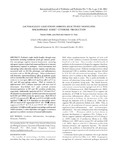Lactobacillus casei strain Shirota selectively modulates macrophage subset cytokine production
| dc.contributor.author | Habil, N | |
| dc.contributor.author | Beal, J | |
| dc.contributor.author | Foey, Andrew | |
| dc.date.accessioned | 2018-10-24T10:40:58Z | |
| dc.date.available | 2018-10-24T10:40:58Z | |
| dc.date.issued | 2012-12-01 | |
| dc.identifier.issn | 1555-1431 | |
| dc.identifier.uri | http://hdl.handle.net/10026.1/12616 | |
| dc.description.abstract |
Probiotics confer health benefits through many mechanisms including modulation of the gut immune system, dut macrophages regulate immune homeostasis, mounting tolerogenic responses to food and commensal bacteria or immune inflammatory responses to pathogens. Local environment and macrophage subset determine immune response and tolerance, associated with an M2-like phenotype and inflammatory activation with an Ml-like phenotype. Subset predominance will determine immunomodulatory effects of probiotic species such as Lactobacillus casei strain Shirota (LcS). The aim of this study was to investigate differential regulatory effects of LcS on Ml and M2 macrophage subsets. PMA or vitamin D3 differentiated THP-1 human monocytic cells were used to investigate heat-killed LcS and secreted protein tmmunoregulation of Ml and M2 cytokine production, respectively. Additionally, regulation of CD 14lo M2 and CD 14hiMl function was investigated Cytokine expression was measured by ELISA and NFkB activity by reporter assay. Both HK-LcS and SP-LcSaugmented IL-lβ, suppressed IL-6 and differentially regulated TNFα and IL-8, dependent on macrophage subset. HK-LcS and LcS-SP augmented CD14hi Ml TNFa whereas suppressed CD14lo M2 IL-6 and CD14hi Ml NFkB. In conclusion, LcS differentially regulates macrophage cytokines and NFkB activation, is subset-dependent and suggests a cautionary approach to probiotic treatment of mucosal inflammation. Copyright © 2012 by New Century Health Publishers, LLC. | |
| dc.format.extent | 1-12 | |
| dc.language.iso | en | |
| dc.title | Lactobacillus casei strain Shirota selectively modulates macrophage subset cytokine production | |
| dc.type | journal-article | |
| dc.type | Journal Article | |
| plymouth.issue | 1 | |
| plymouth.volume | 7 | |
| plymouth.publication-status | Published | |
| plymouth.journal | International Journal of Probiotics and Prebiotics | |
| plymouth.organisational-group | /Plymouth | |
| plymouth.organisational-group | /Plymouth/Faculty of Health | |
| plymouth.organisational-group | /Plymouth/Faculty of Science and Engineering | |
| plymouth.organisational-group | /Plymouth/Faculty of Science and Engineering/School of Biological and Marine Sciences | |
| plymouth.organisational-group | /Plymouth/REF 2021 Researchers by UoA | |
| plymouth.organisational-group | /Plymouth/REF 2021 Researchers by UoA/UoA01 Clinical Medicine | |
| plymouth.organisational-group | /Plymouth/REF 2021 Researchers by UoA/UoA01 Clinical Medicine/UoA01 Clinical Medicine | |
| plymouth.organisational-group | /Plymouth/Research Groups | |
| plymouth.organisational-group | /Plymouth/Research Groups/Institute of Translational and Stratified Medicine (ITSMED) | |
| plymouth.organisational-group | /Plymouth/Research Groups/Institute of Translational and Stratified Medicine (ITSMED)/CBR | |
| plymouth.organisational-group | /Plymouth/Users by role | |
| plymouth.organisational-group | /Plymouth/Users by role/Academics | |
| dc.rights.embargoperiod | Not known | |
| rioxxterms.licenseref.uri | http://www.rioxx.net/licenses/all-rights-reserved | |
| rioxxterms.type | Journal Article/Review |


